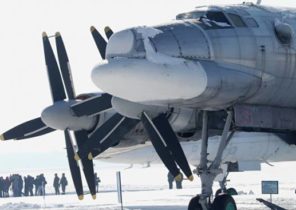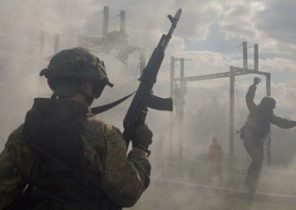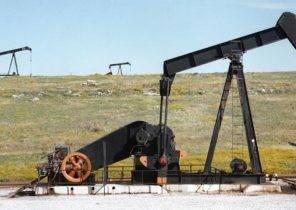Almost nine years after the start of the “Arab spring” not all modes fell, and not all wars have ended. In Yemen the fighting continues, passed from the defensive to the offensive after the Houthis began a counterattack in an attempt to restore what you’ve lost in 2015, including the oil city of Marib. The same thing is happening in Libya, where General Khalifa Haftar in control of most of Libyan territory, pending when war knocks at the door of his citadel East of Sirte. At this time the Syrian Idlib awaits the start of the battle that will determine the fate of the Syrian pie.
This report analyzes the latest developments in these Arab towns. They are all on fire, and their fate could determine the future map of the middle East region.
Libyan Sirte: Government of national consensus is moving to the West, and Haftar is trying to seize the oil
The beginning of the Libyan revolution in February 2011 coincided with the return devoid of the influence and legitimacy of the Libyan General. Three years later, he will attract the attention of all, when you declare themselves politically and ensure a military presence of its forces in most parts of the Libyan territory. Its success will contribute to the public and behind the scenes support to the regional and global players, led by Russia, France, Egypt and the United Arab Emirates.
In April of last year, the Libyan General Khalifa Haftar launched an attack on the Libyan capital is one of the few remaining under the authority of the internationally recognized Government of national consensus cities. However, as subsequent events showed, he made a mistake in their political and military calculations, and instead of the planned two weeks, the standoff lasted 14 months.
After December 2019, the national consensus Government signed an agreement in the field of security with Turkey, the balance of power has changed, and Haftar suffered a crushing defeat. First, he lost the cities around the capital, and then another six strategic settlements on the coastal strip, stretching from the capital to the border with Tunisia. There he was supported by the local tribes. In the end, he took away also the strategic base in al-Watia and the fortified town of Tarhuna, which was considered the center of his operations in the West of Libya.
As follows from the latest military reports, the strength of the Haftarot hold the Central part of Libya, with the exception of the city of Sirte and air force base El Dzhufra. Their fall automatically means the loss of areas to the South, and when the Western, Central and southern regions will be in the hands of government forces, the political influence of the Haftarot will return to the level of September 2016, i.e. before its release to the fore. In that period, the General seized Libya’s “oil Crescent”, where 80% of the country’s oil. Currently, the Government of national accord trying to get the area, and all should decide the future of the battle for Sirte.
According to Reuters, Turkey supported the Libyan government began transporting around 200 military vehicles in preparation for the beginning of the first battles in Eastern Libya. The results should change the balance of power in favor of the prevailing party.
Although Russia had planned to promote the candidacy of Saif al-Islam Gaddafi in place of the Haftarah in case you reject him, she did not want to lose Sirte due to the plans to establish a permanent military base in El Dzhufre similar basis Hamim in Syria. It’d be a good addition to the naval base in the coastal city, thanks to which Russia would have a foothold in North Africa and access via both sides — Syria and Libya — to the Eastern Mediterranean.
The entry of the forces of the national consensus Government in Sirte also threatens the interests of France and Emirates unlike Turkey. Ankara had requested the government to give permission to conduct exploration in the Eastern Mediterranean, which displeased France. As for the Emiratis, they are afraid of losing the ports of Eastern Libya. Currently, the UAE controlled ports of Tobruk and Barca and develop a plan to establish control over the Mediterranean ports through the company Dubai Port.
In addition to the political and economic benefits that the city can give each side one should mention the role of Egypt. He appreciates how the threat of the entry of government forces into the city, which is regarded as the link with the areas of the Haftarot in the East of the country. The capture of Sirte will pave the way to Benghazi, which the Libyan General has chosen as its capital and headquarters for military operations because of the geographic proximity to the Egyptian border.
From a military point of view, the retention of the Haftarot of the city of Sirte and the reflection of a future offensive will provide him the opportunity to retain the South and Libya to protect oil fields, as well as give the General another opportunity to return to Tripoli. As for the national consensus Government, the fall of Sirte, paving the way for the capture of the southern Libya and then return the oil fields under the control of the Haftarot from 2016 through international support.
Yemeni Marib. The oil province and the last strongholds of the “legitimate” government
After more than five years after the start of the Yemen war, Saudi Arabia was not able to return power to the “legitimate Yemeni government” after the Houthi coup in September 2014.
Soon, however, the war had become a multiple, simultaneous conflicts among the six players: Saudi Arabia, Emirates, Houthis, the Yemeni government party “Islah” associated with the “Muslim brotherhood” (banned in Russia — approx. ed.) and the Transitional Council. At this time the political and military balance of power in the North has changed in favor of the Houthis.
Saudi Arabia went to Yemen in March 2015 in the framework of the international coalition, whose aim was to wage war with the Houthis, however, from that date until the present time, the coalition controls the most important and densely populated areas in Yemen, particularly the capital Sana’a and the coastal city of hodeida in the West, where there are two international port. In addition, they fully control the province of Amran, Dhamar, IBB, El-Beida, Mahwah, rhyme’s, the center of the province of Hodeidah and most of his modiri and Hadju, with the exception of two mudiri, and a number of modiri in the province of Taiz.
During protracted war, the Houthis by force of arms in the country has created a new political reality, which has secured a greater political and military influence. In addition, they gained international legitimacy, which was reflected in the recognition of the Houthis as a player whose opinion must be considered in the course of settlement. This transformation has changed the military balance in the five years war. In March of the Houthis began work on the return of the strategic objects, which have lost in 2016.
The process of regaining control over the Northern territories of Yemen Houthis began with success in the area Naham. This is the Eastern gate of Sana’a, which has long been considered the most vulnerable point of the Houthis and the most important front in the hands of the Arab coalition. Then, the Houthis began a fierce battle for control in the province of al-Jawf, bordering Saudi Arabia. As the Advisor to the Yemeni President and former Prime Minister Ahmed bin dager, the fall of this province will put an end to the influence of the coalition in Yemen.
Al Jawf is of great value to opposing forces due to its unique in all respects by geographical position. From a military point of view, the control over it increases the chances of Houthis to retain their old strongholds. If they win, Saudi Arabia, which has more than 266 kilometres of common border with Yemen in the South, will be more vulnerable to attacks and bombings. As for the economic dimension, we are talking about the oil province, the desert which “swim” in a vast number of oil and gas. This is what the Houthis, because the sale of oil will allow them to continue fighting.
The danger lies in the fact that the fall in the province of al-jouf will pave the way to the last battle at the Yemeni Northern oil city of Marib, which is the headquarters of the government. The city is home to the Ministry of defense and other military agencies, and deployed the largest contingent since the war began. In addition, there is a springboard Yemen party “Islah”, affiliated with “Brothers-Moslems”. This means that the loss of the city will be the last Chapter in Yemen’s history.
If the crisis falls into the hands of the Houthis, the Yemeni government will lose its legitimacy, because the Northern province finally captured by the movement as separatist, supported by Emirates, the Transitional Council is trying to seize the southern provinces in accordance with the announced plan. In the coming days, the next target after capture of Socotra and Aden will be the hadhramaut. Will be implemented the same scenario that used the Houthis in the North. If to do conclusions on the basis of the current military situation, Yemen will be divided into a Northern and southern part.
Syrian Idlib: the struggle for presence between Turkey and Russia
Syrian Idlib was one of the first provinces that joined the revolution in March 2011, and later developed into armed conflict. After the regular army has lost control over the city of Idlib has become the headquarters of the Islamist groups and the last stronghold of the Syrian armed opposition.
The city has a strategic importance due to its geographical position. On the one hand, it borders with Turkey, which supports the opposition, and on the other the city of Latakia, a stronghold of the alawites. This minority, to which belongs the head of the Syrian regime of Bashar al-Assad.
Over the past seven years, the Assad regime supported by Russia and Iran, took control of most of the lost territories. In 2017, the opposition forces retreated to Idlib and fought each other in 2017, but the group “Hayat Tahrir al-sham” (formerly “dzhebhat an-Nusra” is banned in Russia — approx. ed.), which includes dozens of armed brigades, still controls the province, where there are more than 2.3 million refugees. Believed to be the militants, this is an important advantage, which will deter Assad from the onset.
From the outset, Turkey tried to intervene to stop the Syrian regime and Russia to achieve victories in Idlib for fear that millions of refugees may pour its southern borders. As you know, currently she has already received some 3.6 million Syrian refugees.
In addition to the refugee crisis, the fall of Idlib, in itself, will put an end to the Turkish role in Syria would deprive the country of spheres of influence, therefore in the city there are Turkish checkpoints. Their task is to prevent any Syrian attack.
According to a military source in the Syrian opposition, the Turkish forces in Idlib there are about 15 thousand soldiers, which means that the military balance is in their favor in any upcoming battle. Moreover, Ankara supports the so-called “Syrian national army” consisting of 60 thousand soldiers, that is the weak point of the Syrian regime.
In March last year, Turkey signed an agreement with Russia on ceasefire in Idlib, although the parties have opposing interests in Syria. Moscow is providing the Syrian regime with military support in restoring control of most of the Syrian regions under the strategy to return Russia to the middle East region. The same plan holds Erdogan for many years, seeking to expand regional influence of Ankara in the middle East, whether in the political, diplomatic, economic or military aspects. Today, the arena of Turkish-Russian confrontation is not only Idlib, but also Libya.
Saeed al-Haj, an expert on Turkish politics, believes that what is happening between Ankara and Moscow in Libya has a great influence on the situation in Syria. According to him, there is a possibility that Russia will react to developments in Libya in Idlib in an attempt to exert pressure on Turkey in order to reach new agreements, especially after Ankara decided to establish two military bases in Libya.
Although the parties to the conflict still manages to negotiate with a view to achieving mutual understanding even in the face of an escalation of military confrontation in Idlib, not far off, despite Russian pressure on Turkey.







